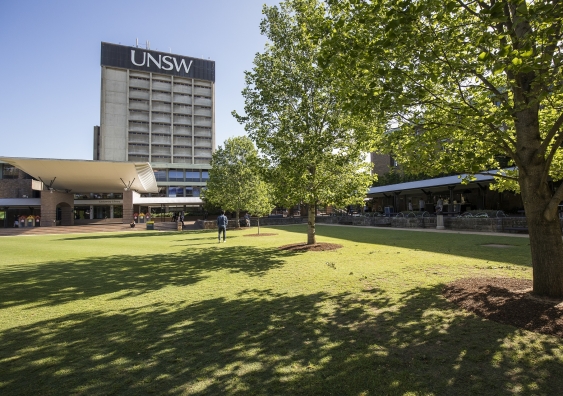UNSW jumps 20 places to 74th globally in ShanghaiRanking’s rating of world universities
UNSW Sydney continues its rise through the ranks to 74th in the Academic Ranking of World Universities.
UNSW Sydney continues its rise through the ranks to 74th in the Academic Ranking of World Universities.

Julia Jones
UNSW External Communications
0431 194 656
j.jones@unsw.edu.au
UNSW has climbed an unprecedented 20 places to 74th in ShanghaiRanking's latest Academic Ranking of World Universities (ARWU), advancing on its goal of becoming a top 50 global university. UNSW moved from sixth to equal fourth nationally with University of Sydney.
UNSW’s strong performance in the 2020 league table is a continuation from last year’s gains where the University made it into the top 100 for the first time.
UNSW President and Vice-Chancellor Professor Ian Jacobs congratulated the hard-working University community on the excellent result.
“Our latest rise in the ARWU ranking moves us closer to our goal to be among the world’s top 50 universities by 2025,” Professor Jacobs said.
“It reflects the superb collective effort of our academic community and hard work to deliver on the challenging objectives in our ambitious 2025 Strategy. An impressive result for UNSW, highlighting our excellence in research in a highly competitive global environment.”
UNSW Deputy Vice-Chancellor, Research, Professor Nicholas Fisk said: “UNSW improved across all the quality and quantity publication indicators, in particular with a 50 per cent rise in Highly Cited Researchers (HCRs) from 2019 to 2020. The large majority of our HCRs are organic UNSW researchers, with only one of the 10 first-time HCRs this year newly recruited from outside UNSW and its affiliated medical research institutes.”
“We support outstanding researchers at all stages of their careers, attracting and nurturing the best and brightest minds. Our significant upward trend in the rankings over the years reflects that.”
The global ranking rise follows UNSW’s strong performance in the 2020 ARWU subject rankings, where UNSW topped the nation for subjects ranked number one in Australia for the third year in a row. In 2020, UNSW and the University of British Columbia had the highest number of subjects included on the list with 52 out of 54. UNSW has 12 subjects ranked as first in Australia: six from engineering, four from social sciences, and two from the natural sciences.
Predominantly based on research performance, the ARWU rankings assesses the number of alumni and staff winning Nobel Prizes and Fields Medals, the number of articles published in the journals Nature and Science, the number of highly cited researchers and number of articles indexed in Science Citation Index - Expanded and Social Sciences Citation Index, and per capita performance with respect to the size of an institution.
UNSW performed well on the 2019 Clarivate Analytics list of Highly Cited Researchers, with 30 academics featured, up from only three four years ago. As a younger university, UNSW again scored zero on the 30 per cent of ARWU allocated for Nobel/Fields awards, making its current achievement even more remarkable.
Published annually by the ShanghaiRanking Consultancy, the ARWU ranks 1000 universities from around the world. Australia now has 23 universities listed in the top 500 universities. Among the Go8 universities, University of Melbourne topped the nation, up three spots over the latest two years to 35th.
American universities continue to dominate the league table with Harvard University topping the list for the 18th year, ShanghaiRanking said in a statement.
A measure of success
UNSW benchmarks itself on the Aggregate Ranking of Top Universities (ARTU), which takes the aggregate ranking of the three most prominent league tables: ARWU, the Times Higher Education (THE) World University Rankings, and the QS World University Rankings. These three rankings allow UNSW to assess itself against a broad range of quantitative and qualitative measures in keeping with a desire to reflect as broad a range of relevant academic indices as possible. In the most recent 2019 ARTU ranking, UNSW placed 55th in the world.
The 2020 edition of the ARTU rankings will be calculated once the 2021 THE World University Rankings are released next month. Given the ARWU result, UNSW expects its ARTU ranking to shift higher despite a one-place drop in the recent QS University Rankings.